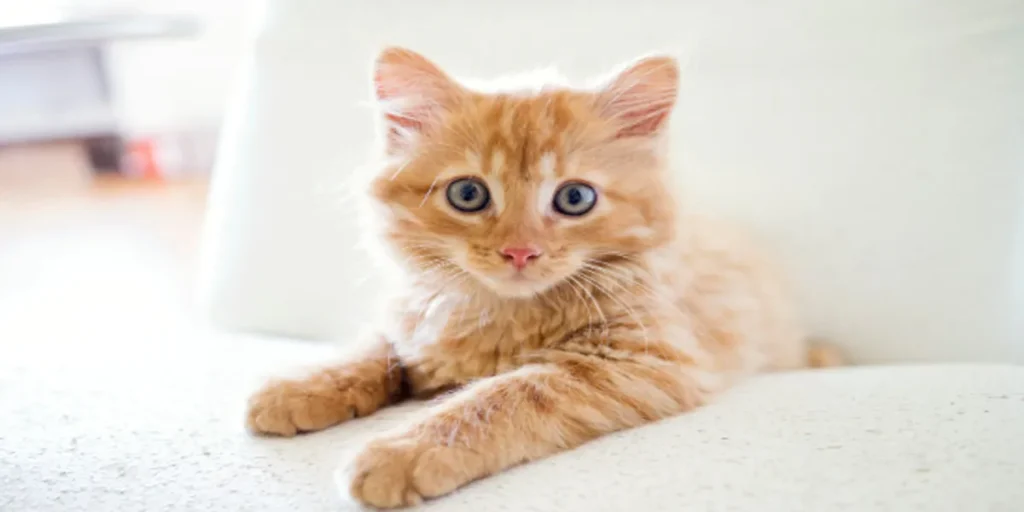A 7-month-old cat typically weighs between 5 to 10 pounds. The weight can vary based on breed and individual growth rates.
Understanding your 7-month-old cat’s weight is crucial for monitoring its health and development.
As young felines grow rapidly during their first year, their weight is a good indicator of their overall well-being.
Domestic cats, much like humans, possess unique body types and genetic predispositions that can affect their size.
It’s essential for cat owners to be aware of what’s normal for their specific pet. Regular weigh-ins can help you ensure that your kitten is on the right track and help you catch any potential health issues early.
Balanced nutrition and the right amount of physical activity play a significant role in maintaining a healthy weight for your growing cat.
Always consult with a veterinarian about your pet’s diet and health to ensure they achieve their milestones appropriately.
Ideal Weight Range For 7-month-old Cats

Understanding the ideal weight for a 7-month-old cat is essential for maintaining their health. A typical 7-month-old kitten should weigh between 5 and 10 pounds.
This range can vary based on several factors. It’s crucial to keep kittens within this range to ensure proper development and avoid health issues.
Factors Influencing Kitten Weight
Several factors can affect the weight of a growing kitten:
- Genetics: Just like people, cats inherit traits from their parents.
- Diet: Proper nutrition is vital for growth.
- Activity level: Active kittens may weigh less.
- Health: Illness can affect weight significantly.
The combination of these factors can lead to variations in size and weight that are perfectly normal.
Weight Chart By Breed
Cat breeds differ in size and weight. Here’s a simple chart to guide you:
| Breed | Average Weight at 7 Months (lbs) |
|---|---|
| Maine Coon | 7-15 |
| Siamese | 5-8 |
| Domestic Shorthair | 5-10 |
| Ragdoll | 6-12 |
| British Shorthair | 7-12 |
Remember, these are averages and some cats may be lighter or heavier. Regular check-ups with a veterinarian ensure kittens grow healthily. A balanced diet and regular play are key.
Nutrition’s Role In Kitten Growth

Healthy weight in kittens leads to adult cats thriving. Nutrition plays a crucial role in kitten growth.
Proper diet supports developing muscles and bones. It also keeps their immune system strong. Understand the key factors shaping your furry friend.
Choosing The Right Diet
Selection of the right diet for your 7-month-old cat is fundamental. Here’s how you can make sure your kitten gets the best:
- High Protein: Kittens need diets rich in protein to grow.
- Fat and Carbs: A balanced amount gives them energy.
- Vitamins and Minerals: Essential for overall health.
Choose kitten-specific food. It has the nutrients young cats need. Always check feeding guidelines on the packaging.
| Type of Food | Quantity |
|---|---|
| Wet Food | 3 cans/day |
| Dry Kibble | 1 cup/day |
Common Feeding Mistakes
Avoid these mistakes to ensure your kitten stays on the path to proper growth:
- Overfeeding: Leads to obesity; follow recommended portions.
- Human Food: Can harm; stick to cat-specific food.
- Ignoring Water: Kittens need fresh water, not just milk.
Monitor weight regularly. A 7-month-old cat typically weighs between 5-10 pounds. Consult your vet for personalized advice.
Health Implications Of Weight
Understanding the health implications of weight in cats is vital. A 7-month-old cat typically ranges from 5 to 10 pounds, but several factors influence this.
Breed, bone structure, and overall health play roles. It’s essential for owners to recognize the risks associated with a cat being under or overweight.
Monitoring your feline friend’s weight can help prevent health issues and ensure a happy, active kitty life.
Risks Of Underweight
An underweight cat may face multiple health challenges. Key risks include:
- Weak immune system – Lower weight can lead to a weakened defense against illnesses.
- Developmental delays – Proper growth may be hindered, affecting bones and muscles.
- Energy deficiency – Less energy for play and exploration can result from malnutrition.
Dangers Of Obesity
On the flip side, obesity poses serious health concerns:
- Joint stress – Extra weight adds pressure to hips and knees, risking arthritis.
- Diabetes risk – Overweight cats can develop diabetes, a life-long condition.
- Shortened lifespan – Excess weight may reduce a cat’s life expectancy.
Monitoring Your Kitten’s Weight
Monitoring Your Kitten’s Weight is crucial for their development and health. At seven months old, your feline friend is nearing adulthood but is still growing.
The right weight ensures they’re on a healthy trajectory. But what numbers should you see on the scale?
Let’s make sure your kitten is not only happy but healthy too with proper weight tracking methods.
Regular Weigh-ins
Keeping an eye on your kitten’s weight need not be a chore. With regular weigh-ins, you can chart your pet’s growth effortlessly. Follow these steps:
- Invest in a pet scale: Accuracy matters, so choose a scale designed for pets.
- Weigh at the same time: Consistency is key; try to weigh your kitten at the same time each day.
- Keep a record: Note down each weight to monitor changes over time.
Understanding Growth Patterns
Growth patterns vary among breeds, but you can spot potential issues early by understanding what’s normal. Use the following table to gauge typical weight ranges at seven months:
| Small Breeds | Medium Breeds | Large Breeds |
|---|---|---|
| <5 lbs (<2.27 kg) | 5-10 lbs (2.27-4.54 kg) | 10-15 lbs (4.54-6.8 kg) |
Remember, these are averages. Your kitten might weigh more or less. Consult with your vet for personalized advice.
Regular weight monitoring helps ensure your kitten is growing at an appropriate rate. It’s a simple step that can lead to a lifetime of good health.
When To Consult The Vet?
Caring for your 7-month-old cat means monitoring its weight closely. An ideal weight is crucial for your kitty’s overall health.
But when do the scales signal a trip to the vet? Let’s explore the signs that suggest your feline friend might need professional help.
Signs Of Unhealthy Weight Gain
A healthy weight contributes to your cat’s vitality and longevity. However, an excessive increase in weight can lead to issues. Be watchful for these warning signs of unhealthy weight gain:
- Difficulty in jumping or moving around
- Less visible or palpable ribs, spine, or waistline
- Shortness of breath or lethargy
- A distended abdomen
Indicators Of Poor Nutrition
Good nutrition is the cornerstone of a cat’s health. Be alert to these indicators that your furry friend might not be getting the right nutrients:
- Dull, flaky coat
- Lack of appetite or voracious eating without weight gain
- Vomiting, diarrhea, or constipation
- Growth slowdown or weight loss
Regular vet check-ups are important. They ensure your cat’s weight and diet are on track.
Upon noticing any strange weight changes, book a vet appointment promptly. Your cat’s health is too important to ignore these signs.
FAQ About the Weight of a 7-Month-Old Cat
What Is Average Weight For 7-month-old Cats?
Healthy 7-month-old cats typically weigh between 5 to 10 pounds. It can vary based on the breed, with larger breeds weighing more.
Regular check-ups are recommended to ensure healthy growth.
How To Tell If A Kitten Is Underweight?
A kitten might be underweight if ribs, spine, and bones are easily palpable. Lack of energy and less playfulness are also signs.
Consult a vet for a proper diet plan to ensure healthy weight gain.
Can A 7-month-old Cat Still Grow?
Yes, a 7-month-old cat can grow significantly. Cats typically reach full size between 12-18 months.
Proper nutrition is crucial for their continued growth and health during this stage.
What Factors Affect A Kitten’s Weight?
Genetics, diet, environment, and overall health affect a kitten’s weight. Some breeds naturally weigh less, while others are larger.
High-quality food and regular exercise contribute to an ideal weight.
Conclusion
Understanding your 7-month-old cat’s weight is crucial for its health and development. Ideal weights vary, but most fall within 5 to 10 pounds.
Regular check-ups and balanced nutrition are key. Monitor your kitty’s growth and consult your vet for tailored advice.
Always prioritize your feline’s well-being for a happy, healthy life.
Resources:
https://www.storycountyiowa.gov/727/Cats-as-Pets
https://www.cdc.gov/healthypets/pets/cats.html
